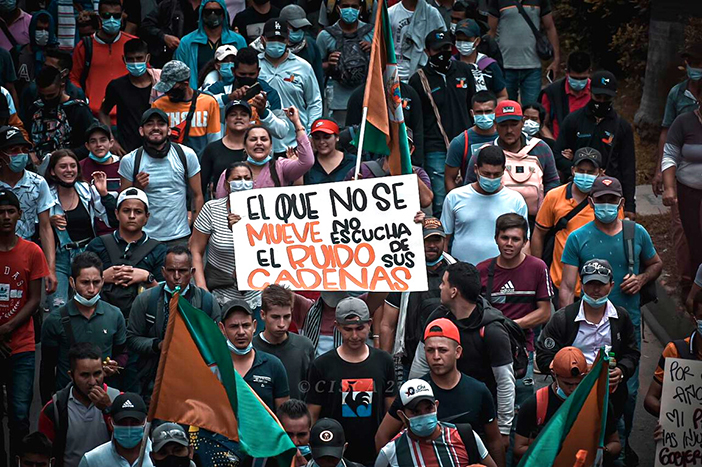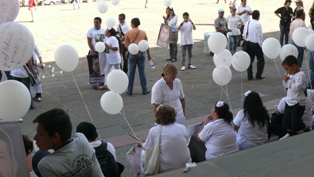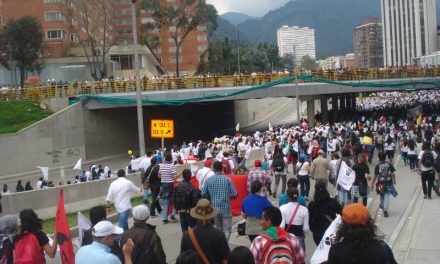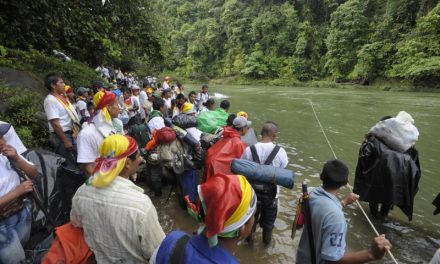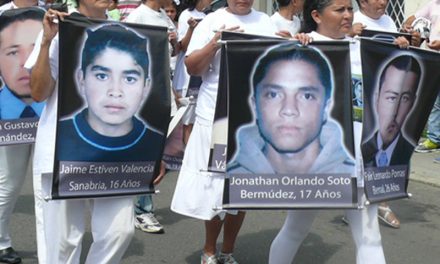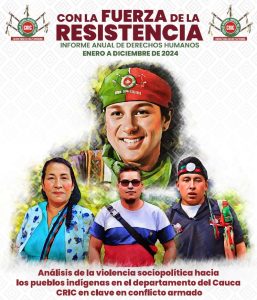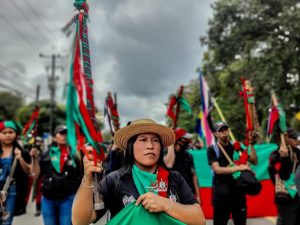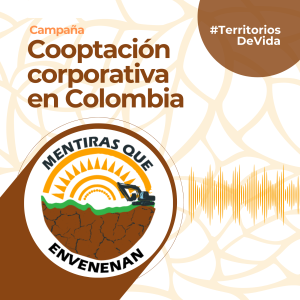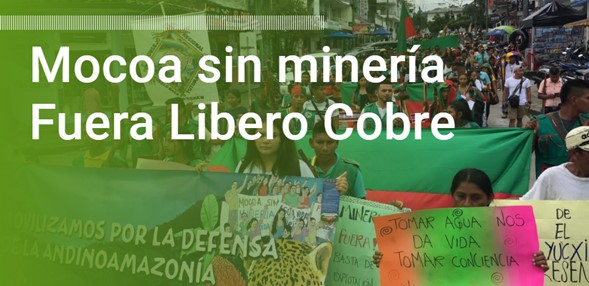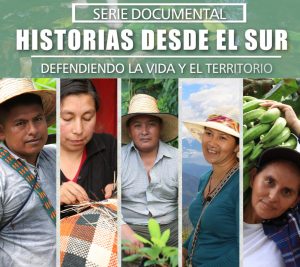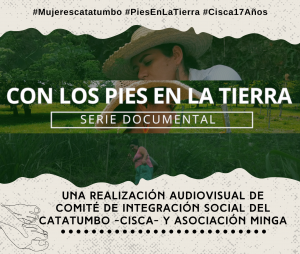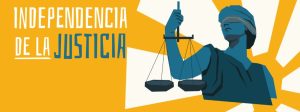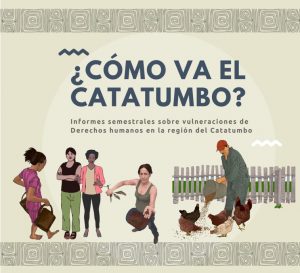La incesante búsqueda del gobierno por limitar el derecho a la protesta social contiene una larga lista de desafortunados y caricaturescos intentos, los cuales se basan en diversos argumentos que han venido posicionándose en los discursos y lenguajes de la élite colombiana. Algunos de ellos claman por la restricción de la protesta en espacios públicos, o exigen el orden público frente a los derechos de los demás, que tiene origen en la frase «mi libertad se termina donde empieza la de los demás» del filósofo Jean – Paul Sartre, los cuales desmitificaremos en un ejercicio de revisión general.
El esfuerzo por limitar la participación ciudadana ha sido una de las banderas políticas del gobierno, los resultados son visibles en el deterioro acelerado del Estado de Derecho, en donde se evidencia que no sólo ha sido limitada la protesta social, sino que por el contrario la mayoría de mecanismos de participación ciudadana han sido eliminados y reducidos. Se eliminaron las consultas populares para la autodeterminación de los municipios y entidades territoriales en el uso de sus territorios, el control judicial ha venido siendo cooptado por el poder ejecutivo y económico y los procesos de fraude electoral y financiación ilegal de campañas son evidentes.
El notorio cercenamiento de derechos, aunado a la peor crisis económica de la historia reciente del país, detonó una fuerte movilización social que venía expresándose años atrás. Pero el aumento de la organización social ha sido contrarrestado por una brutal represión de facto y normativa, dejando uno de los peores saldos de violencia en el marco de la protesta social.
En el ámbito de la legitimación de la represión se ha argumentado la limitación de la protesta social en espacios públicos. Al respecto el Ministerio del Interior realizó una modificación al decreto 003 de 2021 sustentada en que se amplió la definición de protesta, añadiendo que no son pacíficas “aquellas que promuevan el uso de medios para obstaculizar de manera temporal o permanente las vías y la infraestructura de transporte de conformidad con la ley penal”. En primera medida hay que subrayar que el decreto es inconstitucional toda vez que violenta la reserva de ley estatutaria al tratarse de la limitación a un derecho fundamental. Como segundo aspecto es importante precisar que la Corte Constitucional ha planteado claramente que el espacio público no sólo es un ámbito de circulación, sino también un espacio de participación, en donde el desarrollo de las protestas sociales buscan realizar presión ciudadana frente a fallas del Estado.
Así mismo es importante determinar que no todo bloqueo configura un delito y menos aún transforma una protesta pacífica en violenta, característica con la que se pretende limitar y anular el derecho. En relación a ello, la Corte Constitucional en sentencia C- 742 de 2012 resolvió que no se trata de cualquier nivel o grado de perturbación en el servicio de transporte público, colectivo u oficial, sino que tiene que tratarse de una perturbación superlativa, que ni siquiera puede considerarse un grado superior de dificultad para la circulación, sino que es un estado diferente; en otras palabras, es hacer completamente imposible el transporte público, colectivo u oficial, y por tanto no consiste solamente en paralizar o frenar un vehículo o el servicio de transporte público, sino en eliminar cualquier posible condición para la circulación del mismo.
Aunado a lo anterior, para que se configure el delito es imprescindible que se demuestre en concreto que el acto se realizó de tal manera que atentó en realidad contra la vida humana, la salud pública, la seguridad alimentaria, el medio ambiente o el derecho al trabajo. En específico durante el paro nacional se han conformado corredores humanitarios que garantizan los derechos y bienes básicos de la población que en efecto saca de la órbita penal las acciones políticas de las comunidades en medio de las movilizaciones.
El segundo argumento tiene que ver con el orden público y la necesidad de restablecerlo en caso de perturbación. Aquí es importante denotar que ha sido uno de los puntos que recoge el decreto 003 de 2021 y representa el más amplio incumplimiento a las ordenes dictadas por la Corte Suprema de Justicia en sentencia STC-7641 de 2020, que buscaba regular y limitar la actuación policial en la intervención de manifestaciones públicas, en procura de una garantía real del derecho fundamental a la protesta social, la libertad de expresión y el debido proceso. En contravía de ello el decreto no revisó las directrices vigentes con fines de reestructuración policial, continúa justificando el uso de armas de letalidad reducida y mantiene un marco legal que posibilita la brutalidad policial y el uso arbitrario de las funciones de las instituciones militares y policiales.
A partir de la necesidad de mantener el orden público, el gobierno no sólo ha legitimado el uso indebido y excesivo de la fuerza policial, sino que ha limitado per se el ejercicio a la protesta social, lo cual resulta claramente ilegal atendiendo a que los instrumentos internacionales han reconocido que el derecho a la protesta social es en sí mismo conflictivo, sin embargo ésta categoría no puede ser causa de limitaciones.
Para comprender la situación de alteración de orden público, la Corte lo ha definido como «las condiciones de seguridad, tranquilidad y de sanidad medioambiental, necesarias para la convivencia y la vigencia de los derechos constitucionales, al amparo del principio de dignidad humana”. Si la lectura se hiciera desde las realidades sociales de La Guajira, el Pacífico o del Putumayo, la alteración al orden público data de varias décadas atrás y es resultado del abandono estatal, sin que a la fecha existan acciones eficaces de orden estructural que puedan garantizar la dignidad a sus habitantes.
Por último, los límites relacionados con la afectación de los derechos de terceros, en lo que tiene que ver con las cargas que deben soportar las personas que no ejercen directamente el derecho a la protesta, la Convención Americana sobre Derechos Humanos determina que el derecho a la manifestación involucra otro derecho de mayor envergadura, el derecho a la expresión, que representa uno de los primeros y más importantes fundamentos de toda estructura democrática. Por lo tanto, cualquier colisión posible entre éste y otros valores, daría al derecho de reunión y manifestación pública un peso abstracto mayor al de otros.
Es decir, que si las demás personas deben soportar determinadas cargas públicas y limitaciones a algunos derechos, éstas son legítimas dada la categoría conflictiva del derecho. Sin embargo, las limitaciones no podrán ser injustificadas o graves, para lo que cualquier colisión de derechos con la protesta social debe ser analizada caso a caso, ya que sólo el control concreto puede determinar cuándo el ejercicio del derecho a la reunión o protesta puede llegar a ser nugatorio o afectar tales derechos, y es clara en manifestar que si no es posible establecer una afectación real, toda duda se resolverá en favor de los titulares del derecho a la reunión.
En suma, el decreto no logra resolver las mayores vulneraciones al ejercicio del derecho a la protesta social como el uso de armas, las detenciones arbitrarias y el respeto a la prensa; por el contrario, busca deslegitimar la protesta social ubicando acciones legítimas como el corte de vías para calificarla como violenta y permitir el uso de la fuerza en detrimento de los derechos fundamentales de la población. Esta represión viene siendo justificada por el Estado Colombiano y sus argumentos tergiversados prestan base para desmitificar y reiterar contundentemente que la protesta social es un derecho fundamental y está garantizado por normas internacionales y nacionales que nos permiten la libertad, la participación, el ejercicio político y, con mayor importancia, la posibilidad de transformación.
———-
THE LANGUAGE OF AUTHORITARIANISM AND ITS FEAR OF SOCIAL PROTEST
The government’s relentless quest to limit the right to social protest contains a long list of unfortunate and caricatured attempts, which are based on various arguments that have been installed in the discourses and languages of the Colombian elite. Some of them call for the restriction of protest in public spaces or demand public order in the face of the rights of others, which originates in the phrase «my freedom ends where the freedom of others begins» by the philosopher Jean-Paul Sartre, which we will demystify in a general review exercise.
The efforts to restrain citizen participation have been one of the political flags of the government,the results are visible in the accelerated deterioration of the Rule of Law, since its noteworthy that not only has social protest been limited, but also, most of the mechanisms for citizen participation have been eliminated or diminished. Popular consultations for the self-determination of municipalities and territorial entities regarding the use of their territories have been eliminated, judicial control has been captured by the executive branch and the economic groups and the processes of electoral fraud and illegal campaign financing are evident.
The noticeable curtailment of rights, linked to the worst economic crisis in the recent history of the country, detonated a strong social mobilization that had been expressing from years ago. Nevertheless, the strengthening of social organization has been counteracted by a brutal de facto and normative repression, leaving one of the most violent results in the context of social protest.
As indicated above, to legitimize repression, the restriction of social protests in public spaces has been argued. In this regard, the Ministry of the Interior modified Decree 003 of 2021 based on the fact that the definition of protest was expanded, adding that «those that promote the use of means to temporarily or permanently obstruct the roads and transportation infrastructure following criminal law» are not peaceful».
In the first place, it must be emphasized that the decree is unconstitutional since it violates the reservation of statutory law as it is a limitation to a fundamental right. As a second aspect, it is important to point out that the Constitutional Court has clearly stated that public space is not only an area of circulation, but also a space for participation, where the development of social protests seeks to exert citizen pressure against the State failures.It is also important to establish that not every blockade constitutes a crime and even less so transforms a peaceful protest into a violent one, a characteristic that is intended to limit and nullify the right.
Concerning this, the Constitutional Court in Ruling C- 742 of 2012 settled that it is not just any level or degree of disturbance in the public, collective or official transportation service, but it has to be a superlative disturbance, which cannot even be considered a higher degree of difficulty for circulation, but it is a different situation; in other words, it is to make public, collective or official transportation completely impossible, and therefore it does not consist only in paralyzing or slowing down a vehicle or the public transportation service, but in eliminating any possible condition for the circulation of the same.
In addition to the above, for the crime to be committed, it must be concretely demonstrated that the act was carried out in such a way that it threatened human life, public health, food security, the environment or the right to work. Specifically, during the national strike, humanitarian corridors have been formed to guarantee the basic rights and goods of the population, which in effect removes from the criminal orbit the political actions of the communities amid the mobilizations.
The second argument has to do with public order and the need to re-establish it in case of disturbance. It is important to note that this issue was included in Decree 003 of 2021 and represents the broadest non-compliance with the Supreme Court’s ruling STC-7641 of 2020, which sought to regulate and limit police action in the intervention in public demonstrations, in pursuit of a real guarantee of the fundamental right to social protest, freedom of expression and due process. Contrary to this, the decree did not review the existing guidelines for police restructuring, and continues to justify the use of less-lethal weapons and maintains a legal framework that allows police brutality and the arbitrary use of the functions of military and police institutions.
Based on the need to maintain public order, the government has not only legitimized the undue and excessive use of police force, but has also limited per se the exercise of social protest, which is clearly illegal given that international instruments have recognized that the right to social protest is in itself conflictive, but this category cannot be an excuse for restraints.
To understand the situation of public disorder, the Court has defined it as «the conditions of security, tranquility and environmental health, necessary for coexistence and the enforcement of constitutional rights, under the protection of the principle of human dignity». If the interpretation is made from the current social realities of La Guajira, the Pacific or Putumayo, the alterations to public order date back several decades and are the result of state neglect, without the existence of effective structural actions that can guarantee the dignity of its inhabitants.
Finally, the limits related to the affectation of the rights of third parties, in what has to do with the burdens to be borne by persons who do not directly exercise the right to protest, the American Convention on Human Rights determines that the right to demonstrate involves another right of greater scope, the right to expression, which represents one of the first and most important foundations of any democratic structure. Therefore, any possible collision between this and other values would give the right to public assembly and demonstration a greater abstract weight than others.
That is to say, if other people must bear certain public burdens and limitations to some rights, these are legitimate given the conflicting category of the right. However, the limitations may not be unjustified or serious, for which any collision of rights with social protest must be analyzed case by case, since only the specific control can establish when the exercise of the right to assembly or protest can become null and void or affect such rights, and is clear in stating that if it is not possible to establish a real affectation, any doubt will be resolved in favor of the holders of the right to assembly.
In sum, the decree fails to resolve the major violations of the exercise of the right to social protest such as the use of weapons, arbitrary detentions and disrespect for the press; on the contrary, it seeks to delegitimize social protest by locating legitimate actions such as the blocking of roads to qualify it as violent and allow the use of force to the detriment of the fundamental rights of the population. This repression has been justified by the Colombian State and its distorted arguments provide the basis for demystifying and forcefully reiterating that social protest is a fundamental right and is guaranteed by international and national norms that allow freedom, participation, political exercise and, more importantly, the possibility of transformation.

